Masala Masters Duel
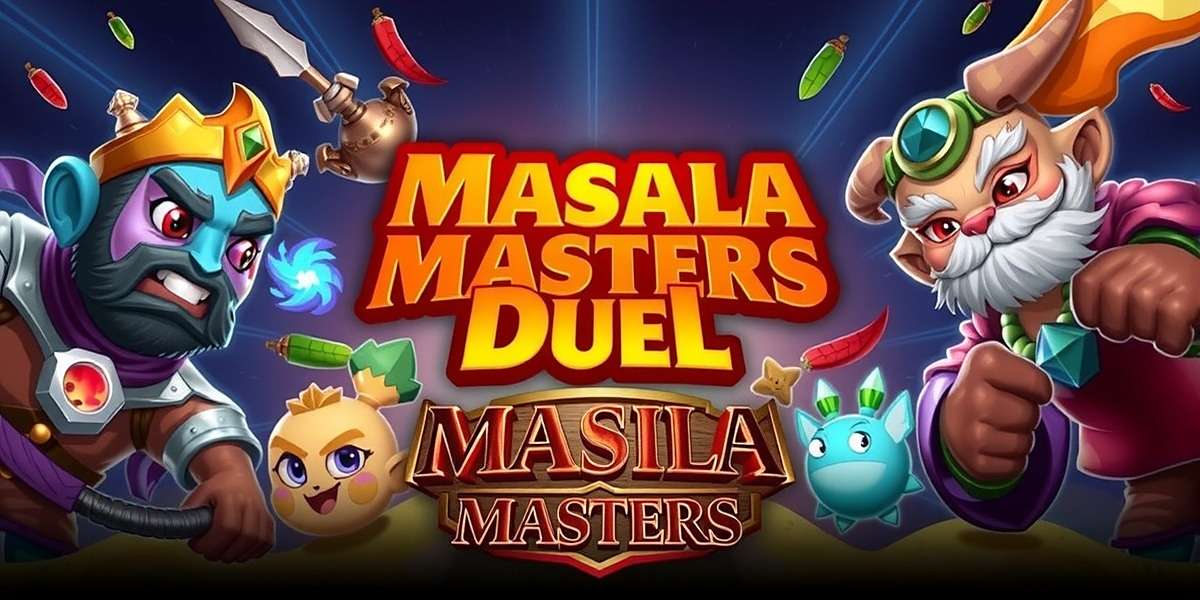
Introduction to Masala Masters Duel
Masala Masters Duel is India's most popular strategic card game that has captured the imagination of millions across the country since its launch in 2022. Developed by Spice Interactive Studios based in Hyderabad, this unique game combines India's rich culinary heritage with exciting strategic gameplay.
The name Masala Masters Duel perfectly reflects the game's core concept – players take on the role of master chefs who battle using decks of cards representing different Indian masalas, spices, and culinary ingredients. Each card has unique abilities inspired by its real-world properties and culinary uses.
What makes Masala Masters Duel truly special is how it has managed to blend traditional Indian elements with modern gaming mechanics. Unlike many generic card games available in the market, this game feels uniquely Indian, resonating with players of all ages and backgrounds.
Whether you're a teenager from Mumbai or a grandmother from a small village in Punjab, Masala Masters Duel offers something familiar yet exciting. The game's popularity can be attributed to its simple rules, strategic depth, and most importantly, its connection to India's diverse food culture.
One of the key factors behind Masala Masters Duel's success is its accessibility. The game can be played on any smartphone, even low-budget models commonly used across India. This has allowed it to reach players in both urban and rural areas, creating a truly national gaming community.
The developers worked closely with culinary experts from different regions to ensure that each card accurately represents its respective masala or spice. From the fiery heat of a Rajasthani lal mirchi to the subtle flavor of Bengali panch phoron, every aspect of Indian cuisine is celebrated in Masala Masters Duel.
🌶️ Fun Fact
The most powerful card in Masala Masters Duel is the "Royal Garam Masala" – a legendary card that combines five different spices, just like the traditional garam masala blend used in North Indian cooking! It's so rare that only 0.01% of players have collected it.
Since its launch, Masala Masters Duel has hosted numerous national tournaments, with the grand finals often televised on sports channels. The game has also been featured in major Indian newspapers and magazines, highlighting its impact on popular culture.
Many schools have even started using Masala Masters Duel as an educational tool to teach children about different spices and regional cuisines in a fun and interactive way. This unexpected development has further increased the game's popularity among families.
With regular updates and new content based on player feedback, Masala Masters Duel continues to grow and evolve, solidifying its position as India's favorite card game.
Gameplay of Masala Masters Duel
The gameplay of Masala Masters Duel is designed to be easy to learn but difficult to master – a perfect balance that appeals to both casual players and serious gamers. At its core, it's a turn-based card battle game where two players compete to reduce each other's "Kitchen Health" from 30 to zero.
Each player constructs a deck of 20 cards from their collection, choosing from hundreds of available cards representing different spices, masalas, cooking techniques, and kitchen tools. Before each match, players can customize their decks to counter their opponent's strategies, adding a layer of strategic planning.

Basic Game Mechanics
Each match in Masala Masters Duel follows a straightforward structure that even new players can quickly understand:
Both players start with 3 cards in their hand and 3 "Spice Points" – the game's resource system used to play cards. Each turn, players gain 1 additional Spice Point (up to a maximum of 8) and draw a new card from their deck.
On your turn, you can play any number of cards as long as you have enough Spice Points. Most cards represent spices or masalas that can attack the opponent directly or summon "Ingredient Warriors" to the battlefield.
Ingredient Warriors stay on the battlefield and can attack each turn, while spell cards (representing cooking techniques) have immediate effects. The goal is to reduce your opponent's Kitchen Health to zero before they do the same to you.
A unique feature of Masala Masters Duel is the "Blend Bonus" system – when you play two or more complementary spice cards in the same turn, you activate special bonuses. For example, playing Turmeric and Chilli together creates a "Curry Boost" that increases all your attack values for that turn.
Game Modes
Masala Masters Duel offers a variety of game modes to keep players engaged:
Quick Cook-Off – Instant 1v1 matches against random opponents. Perfect for short gaming sessions during tea breaks or while commuting. Matches typically last 5-7 minutes, ideal for India's busy lifestyle.
Masala League – Ranked competitive mode where players climb through divisions from "Novice Chef" to "Grandmaster Chef." Each season lasts one month, with exclusive rewards for top players, including rare cards and special avatar frames.
Recipe Campaign – Single-player story mode that takes players on a culinary journey across India. Each region features unique challenges and introduces new cards inspired by local cuisine. The campaign includes interesting facts about Indian spices and cooking traditions.
Family Feast – 2v2 cooperative mode where players team up with friends or family members. Communication and teamwork are key as you combine your card strategies to defeat opposing teams. This mode has become popular during Indian festivals when families gather together.
Regional Tournaments – Limited-time events with rules based on specific regional cuisines. For example, the "Chettinad Challenge" only allows South Indian spice cards, while the "Punjabi Spice Fest" doubles the power of all chilli-based cards.
Master Chef Trials – Special weekly challenges that test players' skills with specific card types or strategies. Completing these trials earns "Recipe Scrolls" that can be exchanged for rare cards and other in-game items.
👨🍳 Basic Strategy Tip
Always keep a balance of low-cost and high-cost cards in your Masala Masters Duel deck. Early in the game, you'll need cheap cards like Cumin Scout (2 Spice Points) to establish your presence, while saving powerful cards like Royal Garam Masala (6 Spice Points) for later turns when you can maximize their impact.
Progression System
As you play Masala Masters Duel, you earn experience points that increase your "Chef Level." Each new level unlocks new features, card slots, and rewards like "Masala Packs" – card packs containing random cards of varying rarity.
Cards come in five rarity levels: Common, Uncommon, Rare, Epic, and Legendary. Higher rarity cards generally have more powerful abilities but are harder to obtain. Players can also combine duplicate cards to create more powerful versions through the "Spice Fusion" system.
The game features a "Daily Masala" reward system that gives players free in-game currency and card packs for logging in each day. This system encourages regular play without requiring financial investment, making the game accessible to all economic backgrounds.
For players who want to progress faster, Masala Masters Duel offers a "Chef Pass" – a seasonal subscription that provides additional rewards for completing daily and weekly challenges. The Chef Pass is priced affordably at ₹99 per month, making it accessible to most Indian players.
New players receive a comprehensive tutorial called "Cooking School" that guides them through basic gameplay mechanics. The tutorial is narrated by Chef Anand, a friendly character who explains game concepts using familiar cooking analogies that resonate with Indian players.
Card Collection in Masala Masters Duel
The heart of Masala Masters Duel is its extensive card collection, featuring over 300 unique cards that celebrate India's diverse culinary landscape. Each card is beautifully illustrated and designed to reflect both its real-world properties and its in-game abilities.
Cards are organized into several categories, each with distinct roles in battle. Understanding these categories is essential for building effective decks and mastering the game's strategic depth.
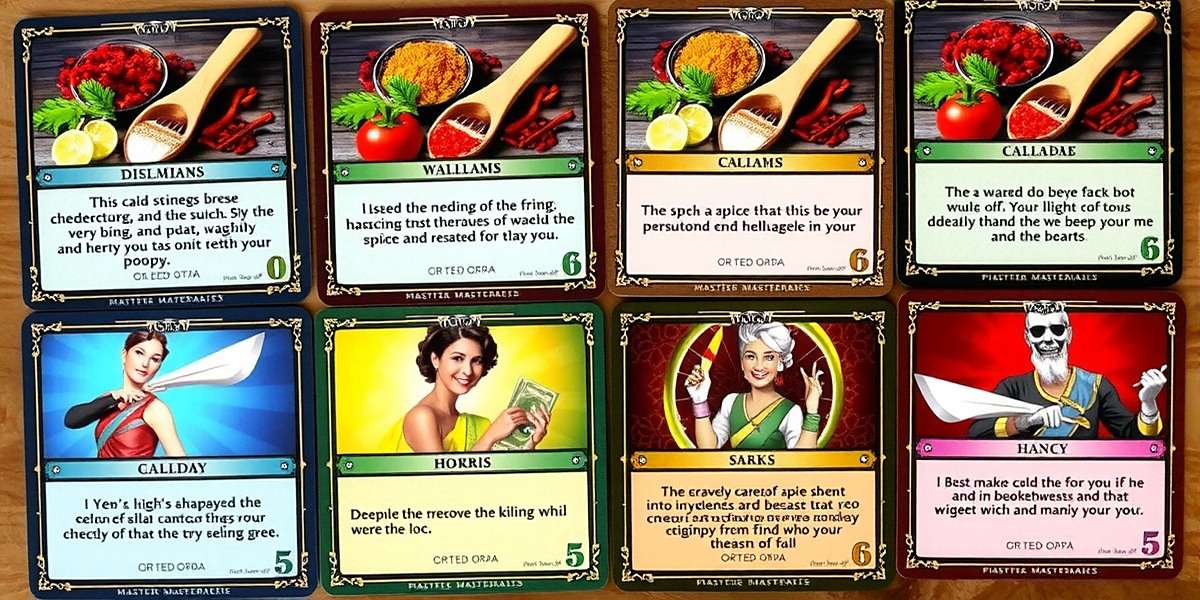
Card Types
Spice Warriors are the primary attacking units in Masala Masters Duel. These cards summon characters representing different spices that remain on the battlefield and can attack each turn.
Red Chilli Ranger
Medium attack power with a chance to burn enemies for extra damage over time. Represents the fiery heat of Indian chillies.
Coriander Commander
Boosts attack power of adjacent Spice Warriors. Reflects coriander's role in balancing flavors in Indian cooking.
Turmeric Tank
High defense with gradual health regeneration. Based on turmeric's medicinal properties and vibrant color.
Masala Spells are one-time use cards that create immediate effects on the battlefield. These represent different spice blends and cooking techniques.
Garam Masala Blast
Deals area damage to all enemy units. More powerful when used with other North Indian spice cards.
Chettinad Fire
Targets a single enemy for massive damage. South Indian specialty card with high spice point cost.
Panch Phoron Protection
Creates a shield around all friendly units for 2 turns. Based on the five-spice blend from Bengal.
Kitchen Tools are support cards that provide ongoing benefits or modify gameplay mechanics. These represent essential cooking implements used across India.
Uttapam Tawa
Increases the attack of all South Indian Spice Warriors. Stays in play until destroyed.
Tandoor Flame
Gradually increases Spice Points each turn. Based on the traditional North Indian clay oven.
Pressure Cooker
Allows playing one extra card per turn for 3 turns. Represents the time-saving kitchen appliance.
Special Dishes are powerful cards that can turn the tide of battle when played at the right moment. These represent iconic Indian dishes from different regions.
Butter Chicken
Heals all friendly units and increases their attack for 2 turns. High spice point cost but game-changing effect.
Hyderabadi Biryani
Summons multiple rice and meat warrior units at once. Perfect for overwhelming opponents.
Gujarati Dhokla
Creates multiple copies of one friendly unit. Strategic card for building powerful armies.
Regional Card Sets
North Indian Collection features spices and dishes from Punjab, Uttar Pradesh, Rajasthan, and Kashmir:
- Kashmiri Mirchi Marauder – Freezes enemy units with its intense cold climate adaptation
- Punjabi Butter Guru – Heals and strengthens nearby units with its rich, creamy properties
- Rajasthani Red Chilli Rajah – Powerful attacker that grows stronger in dry conditions
- Awadhi Biryani Baron – Summons a royal feast that boosts all friendly units
South Indian Collection showcases flavors from Tamil Nadu, Kerala, Karnataka, and Andhra Pradesh:
- Chettinad Pepper Prince – Rapid attacker with piercing damage abilities
- Kerala Clove Commander – Provides protection against magical attacks
- Andhra Gunpowder General – Explosive area damage with chain reaction potential
- Mysore Masala Monarch – Balances attack and defense with perfect spice harmony
East Indian Collection highlights spices from Bengal, Odisha, Bihar, and Assam:
- Bengali Panch Phoron Priest – Buffs multiple units with balanced flavor bonuses
- Assamese Bamboo Shooter – Sneak attacker that can bypass enemy defenses
- Odia Rasagola Sage – Heals friendly units while confusing enemies with sweetness
- Bihari Litti Chokha Champion – Tank unit with self-sustaining abilities
West Indian Collection features spices from Maharashtra, Gujarat, Goa, and Rajasthan:
- Maharashtrian Goda Masala Maven – Creates illusions of additional units to confuse enemies
- Gujarati Jaggery Jester – Uses sweetness to disarm enemy attacks and redirect damage
- Goan Vindaloo Viking – Berserker unit that grows stronger as it takes damage
- Rajasthani Laal Maas Monarch – Powerful late-game unit requiring specific conditions to summon
💎 Collection Tip
To complete your Masala Masters Duel collection efficiently, focus on regional events that feature cards you're missing. For example, the Pongal Festival event increases drop rates for South Indian cards by 300%! Participate in as many regional events as possible to collect all unique cards.
Legendary Cards
The most coveted cards in Masala Masters Duel are the Legendary Chef cards, each representing a master of a particular regional cuisine with game-changing abilities:
Chef Sanjeev Kapoor (All-Rounder) – The most versatile legendary card that can adapt to any situation. When played, allows you to choose one ability from any other card in the game.
Chef M.S. Swaminathan (Agricultural Specialist) – Slowly grows more powerful over time, representing the growth of crops. After 5 turns, creates a "Harvest" that refills your hand and spice points.
Chef Tarla Dalal (Gujarati Expert) – Creates duplicate copies of all your kitchen tool cards, doubling their effects. Perfect for players who use tool-based strategies.
Chef Madhur Jaffrey (Global Indian Cuisine) – Can "fuse" two different regional cards to create a new hybrid card with combined abilities. Requires high skill to use effectively.
Legendary cards in Masala Masters Duel are extremely rare, with only a 0.5% chance of being found in standard Masala Packs. They can be more easily obtained through special events, tournament rewards, or by combining 100 rare spice fragments.
Many players consider collecting all legendary cards to be the ultimate achievement in Masala Masters Duel, with less than 2% of the player base having completed this feat as of 2023.
Localization and Regional Versions
One of the most impressive aspects of Masala Masters Duel is its extensive localization effort that goes far beyond simple translation. The game offers 15 regional language versions, each with unique content that reflects local culture, humor, and culinary traditions.
This commitment to authentic regional representation has helped Masala Masters Duel achieve widespread popularity across India's diverse linguistic landscape. Players from different regions report feeling seen and celebrated through the game's thoughtful localization.
| Language | Special Features | Regional Events |
|---|---|---|
| Hindi | Bhojpuri and Punjabi dialect options, special "Pani Puri" power-up animations | Holi "Gulal Attack" mode, Diwali "Mithai Boost" event |
| Tamil | Carnatic music soundtrack, Chennai slang in character dialogues | Pongal "Sakkarai Pongal" healing event, Tamil New Year card packs |
| Bengali | Baul folk music integration, special fish curry-themed power-ups | Durga Puja "Ashtami Annihilation" tournament, Poila Boishakh rewards |
| Telugu | Special "Pulihora" combo bonus, Tollywood-style victory animations | Sankranti kite-flying minigame, Ugadi new card releases |
| Gujarati | Garba rhythm battle music, "Fafda-Jalebi" recovery items | Navratri "Garba Formation" team event, Uttarayan kite power-ups |
| Marathi | Special "Vada Pav" combo attacks, Lavani music during battles | Ganesh Chaturthi "Modak Mission," Gudi Padwa celebrations |
| Malayalam | Kathakali-inspired card animations, "Sadya" feast bonus rounds | Onam "Pookalam" pattern bonuses, Vishu new year events |
Regional Gameplay Differences
Unlike many games that simply translate text, Masala Masters Duel features subtle gameplay differences in regional versions that reflect local culinary traditions and preferences:
In the Tamil version, coconut-based cards have enhanced abilities, reflecting coconut's importance in South Indian cuisine. The "Coconut Crusher" card, for example, deals 20% more damage in the Tamil version compared to other language versions.
In the Punjabi variant of the Hindi version, butter and cream-based cards like "Butter Chicken Barrage" have increased healing properties, aligning with the rich, creamy nature of Punjabi cuisine. These cards also feature unique animations showing traditional Punjabi cooking methods.
The Bengali version includes special mustard oil-based power-ups that aren't available in other versions, while the Gujarati version features jaggery-based healing items that provide extra benefits during cooperative gameplay – reflecting Gujarati culture's emphasis on community and sharing.
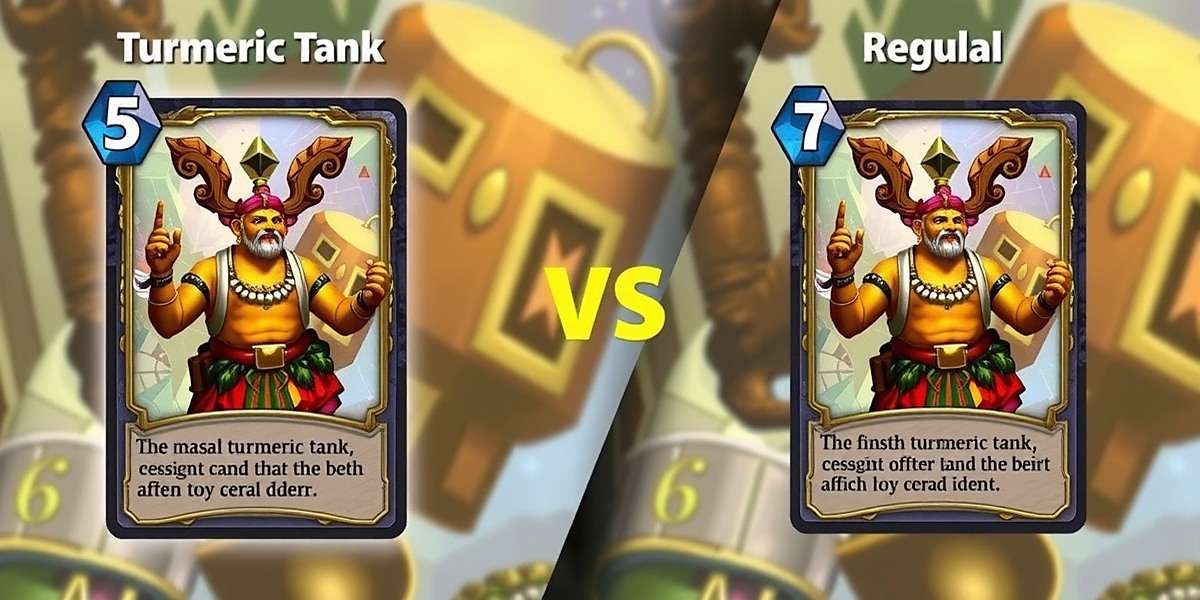
Cultural References and Humor
Each regional version of Masala Masters Duel is filled with localized humor and cultural references that resonate deeply with local players. These touches demonstrate the developers' commitment to authentic representation rather than generic localization.
The Marathi version includes a special "Vada Pav Assault" combo where the Potato Patty card teams up with the Chutney Commander for devastating effect – a clear reference to Mumbai's favorite street food. Loading screens feature famous Marathi proverbs related to food and cooking.
In the Malayalam version, the Cardamom King card often makes references to Kerala's cardamom plantations and has a victory animation where he performs a traditional Kathakali pose. The tutorial is narrated in the style of a popular Kerala cooking show host, with friendly humor that local players immediately recognize.
The Punjabi dialogues are filled with food-related humor, with the Ginger Guardian frequently making jokes about "adaa" (ginger) in both its literal sense and its colloquial meaning of "style" or "attitude" in Punjabi. These linguistic nuances would be lost in a simple translation.
These cultural touches have made Masala Masters Duel more than just a game – it's become a platform for celebrating India's diverse culinary heritage, allowing players from each region to see their traditions reflected and celebrated.
Many players have reported learning about other regional cuisines through the game, fostering cross-cultural understanding. A recent survey found that 63% of Masala Masters Duel players have tried cooking a dish from another Indian region after encountering it in the game.
Download Statistics and Player Base
Masala Masters Duel has achieved remarkable success in the Indian gaming market, with over 58 million downloads across all platforms as of October 2023. This makes it one of the most downloaded Indian-developed mobile games of all time.
The game has maintained steady growth since its launch, with an average of 450,000 new downloads per week. This consistent performance reflects the game's broad appeal across different demographics and regions of India.
Regional Popularity
Masala Masters Duel has found significant success across all regions of India, with particularly strong performance in these states:
- Maharashtra – 23% of total player base, highest engagement with daily challenges and events
- Tamil Nadu – 19% of total player base, most active in ranked league matches
- Uttar Pradesh – 17% of total player base, largest number of daily active users
- Kerala – 12% of total player base, highest in-app purchase rate, especially for premium card packs
- West Bengal – 10% of total player base, strongest participation in cooperative game modes
One of Masala Masters Duel's most impressive achievements is its penetration in rural areas, with 42% of its player base coming from non-urban regions. This is significantly higher than the industry average of 28% for mobile strategy games in India.
This rural popularity can be attributed to several factors, including the game's optimization for low-end Android devices, its offline play mode, and its relatable cultural themes that resonate with players regardless of urban or rural background.
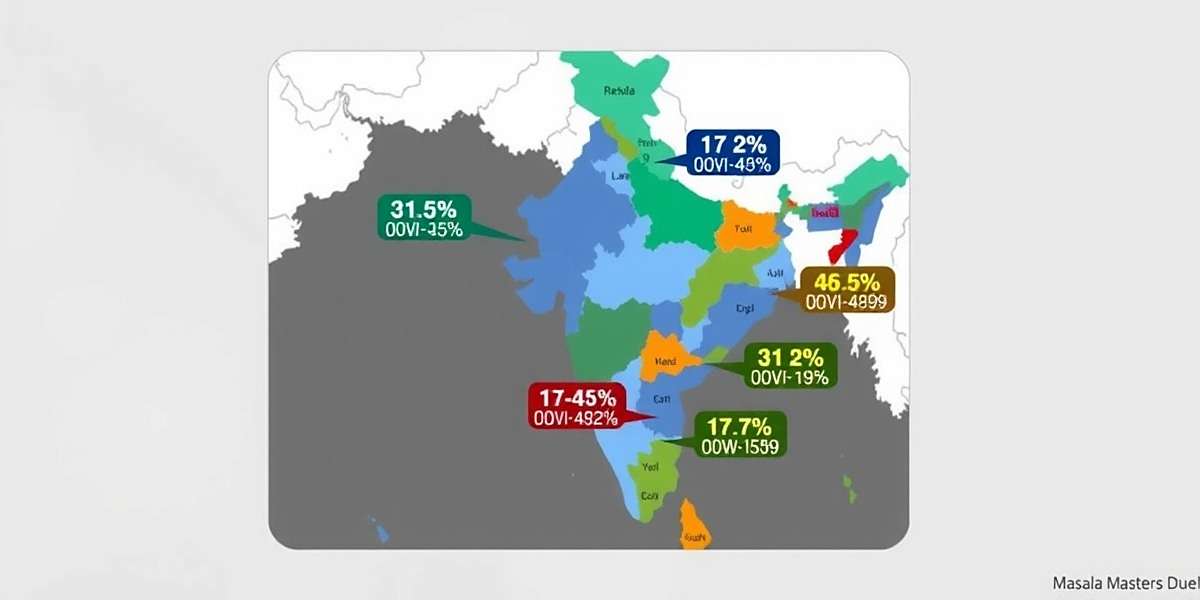
Demographic Insights
Masala Masters Duel has a remarkably balanced player base compared to most mobile games, with 54% male and 46% female players. This near-equal gender distribution is rare in the strategy game genre and speaks to the game's universal appeal across genders.
The age distribution is also broader than average for mobile games in India:
- 13-18 years: 24% of players
- 19-25 years: 31% of players
- 26-40 years: 32% of players
- 41-55 years: 10% of players
- 56+ years: 3% of players
This wide age range demonstrates how Masala Masters Duel's cultural themes resonate across generations, with many families reporting that multiple generations play the game together.
Player behavior analysis reveals interesting regional patterns. For example, players in South India tend to play longer sessions (average 32 minutes) but less frequently (3-4 times per week), while players in North India play shorter sessions (average 15 minutes) but more frequently (6-7 times per week).
Device analysis shows that 78% of Masala Masters Duel players use Android devices, with 73% of those using devices priced below ₹15,000. This highlights the game's successful optimization for India's mid-range smartphone market, which represents the majority of mobile users in the country.
The game's developers have stated that they prioritize performance on lower-cost devices, ensuring that Masala Masters Duel remains accessible to as many Indian players as possible regardless of their device capabilities.
Player Reviews and Ratings
Masala Masters Duel has received overwhelmingly positive reviews from Indian players, maintaining an average rating of 4.7 out of 5 across both Google Play Store and Apple App Store from over 250,000 reviews. This places it among the highest-rated Indian mobile games of all time.
Players particularly praise the game's innovative theme, cultural authenticity, and strategic depth. The regional localization efforts have also received widespread acclaim, with many players appreciating seeing their local traditions reflected in the game.
"Masala Masters Duel is like a piece of home in my phone! As a Gujarati, I love how they've included our traditional spices and even our festival special dishes. The Navratri event with Garba music while playing is just brilliant. My wife and I play every night after dinner – it's become our new family tradition!"
"I've never seen a game that understands Tamil culture so well! The Pongal event in Masala Masters Duel brought tears to my eyes with how accurately it represented our traditions. My children are learning about our spices and cooking through this game – it's both entertaining and educational. The Tamil voice acting is perfect, not like those cringy translations in other games."
"Masala Masters Duel is the best card game I've played in years. The strategic depth is amazing, and I love collecting all the regional cards. The only reason I'm not giving 5 stars is that I wish they would add more North Indian street food cards. The butter chicken card is great, but we need more like chole bhature or aloo tikki!"
"Being a Bengali, I was thrilled to see proper representation in Masala Masters Duel. The panch phoron card works exactly like it does in our cooking – balancing all the other flavors! The Durga Puja event was spectacular with the dhak music and the special maach bhaja (fried fish) power-up. My whole family plays together during festivals now."
"Masala Masters Duel captures the essence of Hyderabadi cuisine perfectly! The biryani card is my favorite – so powerful when played with the right spices. I love that the game works smoothly even on my old phone. The only improvement I'd suggest is adding more Andhra spices like guntur chilli and adding a special Ramadan event."
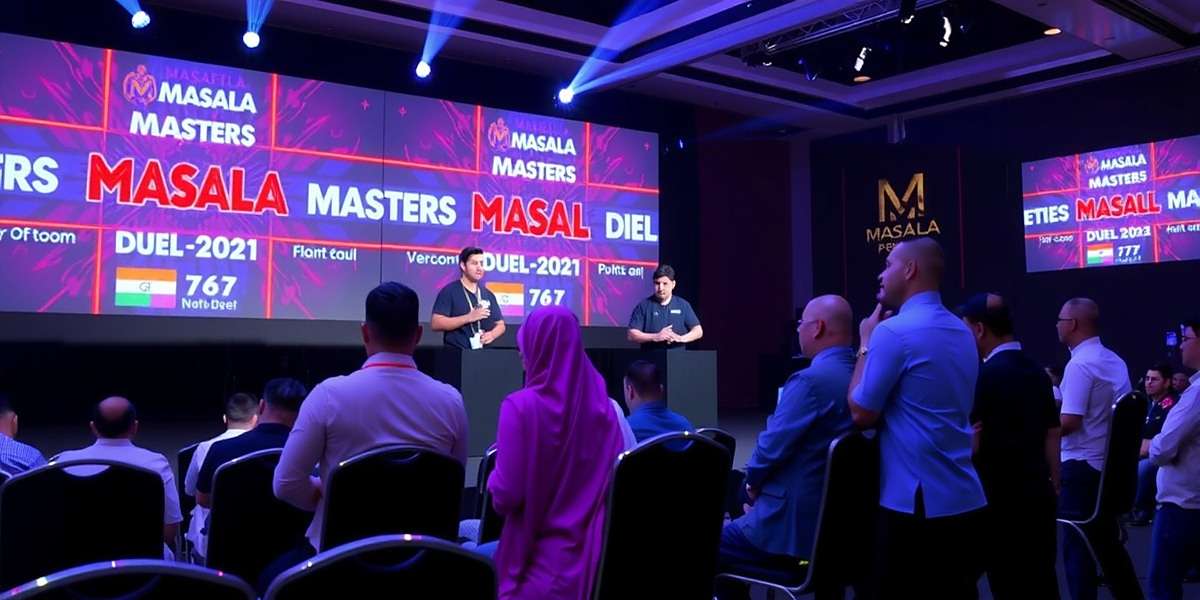
Critic Reviews
Indian gaming publications and critics have also praised Masala Masters Duel for its innovation and cultural representation:
"Masala Masters Duel achieves something truly special – it's a game that feels authentically Indian without resorting to stereotypes. The way it weaves India's culinary heritage into its gameplay mechanics is nothing short of genius." – Indian Gaming Weekly
"The regional localization in Masala Masters Duel sets a new standard for the industry. Playing the Tamil version after trying the Bengali version feels like experiencing a different game, yet it maintains perfect consistency in core gameplay. This is how localization should be done." – Tech Today India
"What makes Masala Masters Duel stand out is its cross-generational appeal. We've seen grandparents teaching grandchildren about traditional spices while competing in card battles – creating moments of connection that are rare in modern gaming." – Mobile Gaming Magazine
"The strategic depth of Masala Masters Duel belies its simple premise. The blend bonuses and regional card synergies create a metagame that's constantly evolving, keeping even the most experienced players engaged." – Gaming India Pro
Critics have also praised the game's business model, noting that while it offers in-app purchases, it's entirely possible to enjoy and excel at Masala Masters Duel without spending money – a refreshing approach in the mobile gaming market.
Festival Events and Local Celebrations
One of the most beloved aspects of Masala Masters Duel is its extensive calendar of festival events that celebrate India's diverse cultural traditions. These events are not mere reskins but introduce unique gameplay mechanics tied to each festival's customs and culinary traditions.
Each event is meticulously localized, with different regions experiencing variations that reflect their specific traditions. This approach has made the game's events highly anticipated across all player communities.
Major Festival Events
Diwali Celebration transforms Masala Masters Duel with a two-week event featuring:
- Diya-inspired healing stations on the battlefield that restore health to friendly units
- Rangoli patterns that grant special bonuses when cards are placed on them
- Special "Lakshmi's Blessing" card that doubles rewards for 24 hours
- Firecracker-themed power-ups that deal area damage to multiple enemies
- Limited-time "Mithai Master" legendary card that can only be obtained during Diwali
- Regional variations like "Punjabi Ladoo" healing cards and "South Indian Murukku" defensive cards
Holi Festival brings vibrant colors to the game with these features:
- Color powder mechanics where players can "dye" enemy cards, reducing their effectiveness
- Special "Thandai Tonic" that temporarily boosts all healing effects
- Regional variations like "Bhang Boost" in North Indian versions that increases card power
- Rain dance minigame during loading screens that grants bonus spice points
- Limited "Rainbow Gulal" skin for all chilli cards, changing their appearance each turn
- Team-based "Color War" mode where players join one of four color teams for daily rewards
Durga Puja Event in Bengali versions and other eastern regions includes:
- 10-day progressive challenge matching the festival's duration
- Daily boss battles against mythical demons from Durga mythology
- Pandal-themed battle arenas with intricate artistic designs from famous Kolkata pandals
- Dhaak drum rhythm-based combo system for extra damage
- Special "Maa Durga" legendary card that can only be obtained by completing all 10 days
- Special "Bhog" healing items inspired by traditional Puja offerings
Pongal/Sankranti Festival in South Indian versions features:
- Rice collection mechanics where harvested rice can be exchanged for rewards
- Kite-flying minigame that unlocks special power-ups when successful
- Sugarcane juice healing stations that gradually restore health over time
- Special "Jallikattu Bull" card that charges through enemy lines dealing massive damage
- Decorative kolam patterns on battlefields that provide strategic advantages when activated
- Multiplayer "Harvest Festival" mode where players cooperate to gather resources
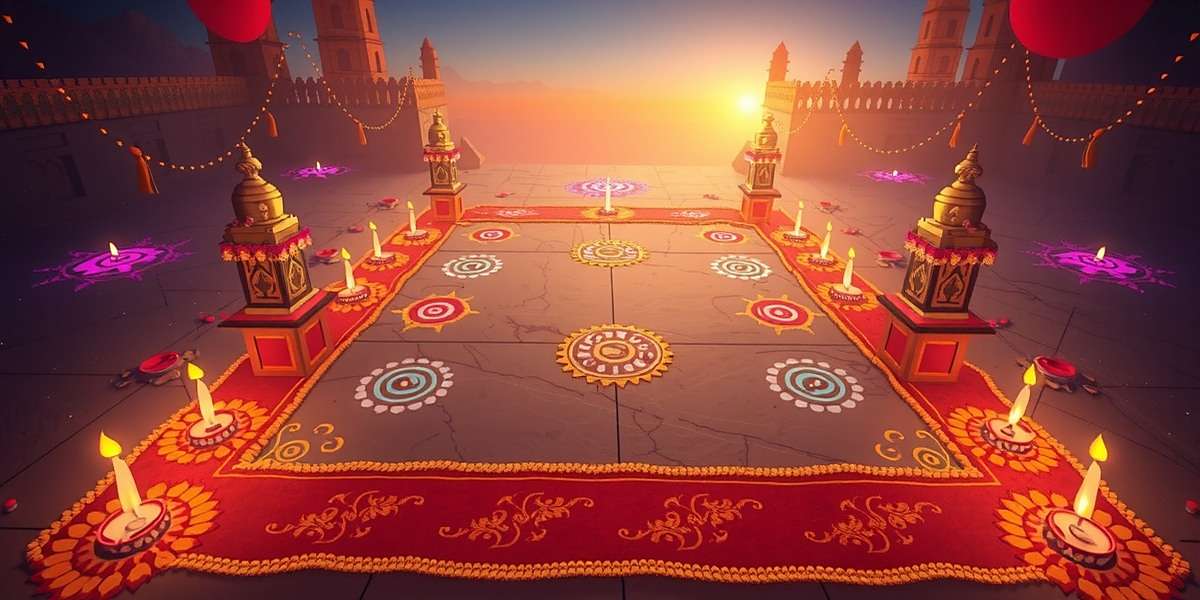
Regional Special Events
Beyond national festivals, Masala Masters Duel celebrates regional events that may be less known outside specific states:
Onam Celebration (Kerala) features boat race-inspired team battles where players must work together to move their "snake boat" card across the battlefield while collecting flowers for points. The event includes a special "Pookalam" formation bonus when cards are arranged in specific patterns resembling traditional Onam flower carpets.
Gujarati Navratri introduces Garba dance mechanics where card placement must follow rhythmic patterns to maximize effectiveness. Each night of Navratri unlocks a new "Devi" card with unique abilities, and the final night features a massive "Garba Raas" battle with all nine Devis working together.
Maharashtra's Ganesh Chaturthi event includes a special "Modak Mission" where players collect sweet offerings to summon Lord Ganesha as a powerful ally. The immersion is enhanced with traditional Ganapati Bappa songs in the background and modak-themed healing items that provide greater benefits when shared with teammates.
Bihu Festival (Assam) features bamboo dance-inspired movement mechanics and special tea leaf power-ups that grant vision of the opponent's next moves. The event includes traditional Bihu dance animations for card victories and a "Bhaona" story mode that tells traditional Assamese tales through gameplay.
Rajasthan's Teej Festival introduces special rain-themed cards that grow more powerful over multiple turns. The event features ghoomar dance animations and traditional sweets like ghevar as power-up items.
📅 Festival Event Strategy
During festival events in Masala Masters Duel, focus on completing the daily event challenges first before playing ranked matches. Event rewards often include powerful temporary cards that can give you an edge in regular gameplay during the event period. Also, don't forget to check the regional variations – sometimes the best rewards are in the localized versions of events!
Seasonal Events
In addition to festival celebrations, Masala Masters Duel features seasonal events that align with India's agricultural cycles and changing seasons:
Monsoon Magic (July-September) – Water-based cards gain enhanced abilities, and special "Rain Dance" combos provide bonus spice points. The event includes flood mechanics that can change battlefield dynamics.
Harvest Hustle (October-November) – Crop and vegetable-based cards become more powerful, and players can collect "Harvest Points" to exchange for rare cards. The event features beautiful autumn-inspired backgrounds.
Winter Warmth (December-February) – Spicy cards that generate "heat" become more effective, and special warming dishes provide battlefield bonuses. The northern version features snow effects and winter special cards.
Spring Spice (March-May) – Fresh herb and flower-based cards gain enhanced abilities, and the battlefield features blooming flowers that provide various bonuses. The event includes a "New Year" celebration with special rewards.
These seasonal events ensure that Masala Masters Duel always feels fresh and relevant, with gameplay adapting to the changing seasons and providing new challenges throughout the year.
Indian Player Strategies and Tactics
Indian players have developed unique strategies for Masala Masters Duel that draw not just on game mechanics but also on cultural knowledge of spices and their traditional uses. These strategies often reflect regional cooking styles and flavor preferences, creating a rich metagame that varies across India.
From the bold, aggressive strategies favored in North India to the subtle, balanced approaches preferred in South India, Masala Masters Duel strategy has become a reflection of India's diverse culinary traditions.
Regional Deck Strategies
North Indian Spice Rush (Punjab, Haryana, Uttar Pradesh):
Players from northern states often prefer aggressive decks with lots of high-damage chilli cards and quick attacks. The typical strategy is to overwhelm opponents early with a flurry of low-cost attackers before they can establish defenses.
Key cards in this strategy include Kashmiri Chilli Commander, Butter Chicken Blitz, and the Garam Masala Barrage spell. The goal is to deal enough damage to the opponent's Kitchen Health before they can mount an effective counterattack.
Northern players often say this strategy reflects their preference for bold, spicy flavors that make an immediate impact – much like their cooking style! They often refer to this approach as "Mirchi Attack" (Chilli Attack) in local forums.
South Indian Spice Blend (Tamil Nadu, Kerala, Karnataka):
South Indian players tend to favor more balanced decks that focus on synergy between cards, much like the complex spice blends in South Indian cuisine. These decks often include a mix of attackers, defenders, and support cards that work together to create powerful combinations.
Essential cards include Turmeric Tank (for defense), Coconut Captain (for protection), and Chettinad Pepper Power (for controlled damage). The strategy involves building up a strong battlefield presence over time and then striking with well-coordinated attacks.
This patient, layered approach mirrors the careful blending of spices in traditional South Indian cooking, where multiple flavors combine to create a harmonious whole. South Indian players often call this strategy "Masala Milagu" (Spice Pepper) style.
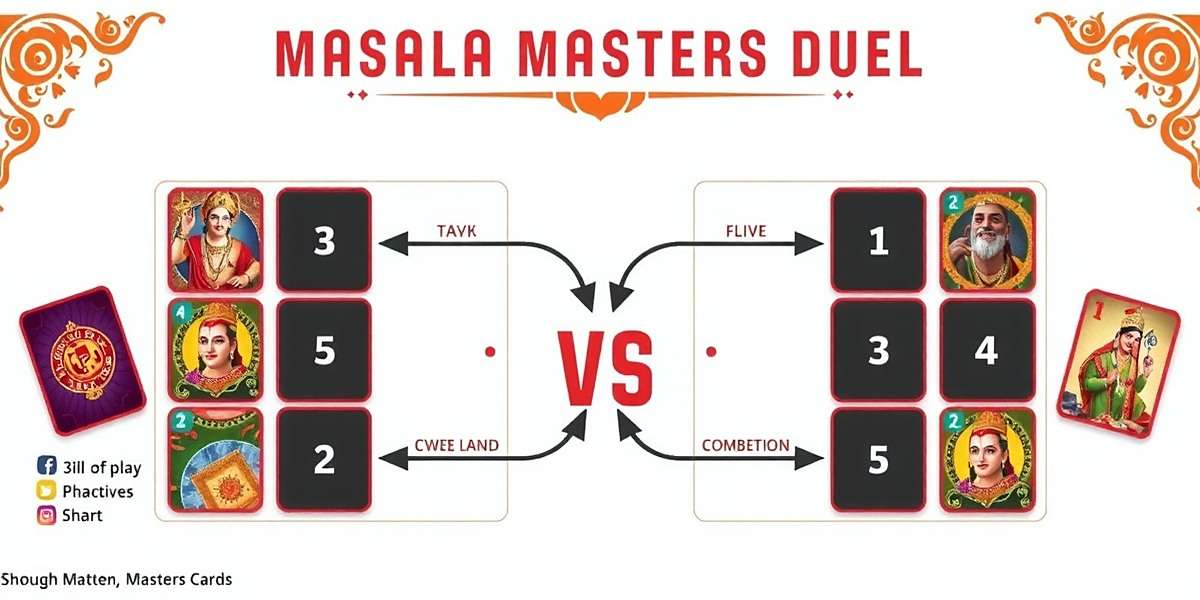
East Indian Flavor Control (West Bengal, Odisha, Assam):
Eastern players often employ control-oriented strategies that focus on disrupting the opponent's plans while gradually building their own forces. These decks include many cards that can disable or delay enemy units.
Key cards include Panch Phoron Puppeteer (for controlling enemy movements), Mustard Marshal (for area control), and Rasgulla Redirector (for deflecting damage). The strategy involves limiting the opponent's options while slowly accumulating advantages.
This thoughtful, strategic approach reflects the subtle, nuanced flavors of East Indian cuisine, where balance and restraint are valued. Eastern players refer to this approach as "Jhaal Control" (Spice Control) strategy.
West Indian Spice Variety (Maharashtra, Gujarat, Goa):
Western players tend to use flexible decks with a wide variety of cards that can adapt to different situations. These decks often include unexpected combinations that can catch opponents off guard.
Important cards include Vada Pav Vanguard (for surprise attacks), Jaggery Jester (for healing and defense), and Goan Vindaloo Vanguard (for sustained damage). The strategy involves adapting to the opponent's moves while maintaining multiple options.
This versatile approach mirrors the diverse culinary traditions of Western India, from the spicy curries of Goa to the sweet-savory combinations of Gujarat. Western players often call this "Chutney Chaos" strategy due to its unpredictable nature.
Advanced Tournament Tactics
Top Indian players in Masala Masters Duel tournaments employ these advanced tactics that have been developed through years of competitive play:
Mind Games with Mulligans – During the initial card selection phase, intentionally discarding powerful cards can trick opponents into revealing their strategy. This is especially effective in high-stakes tournament matches where mind games play a crucial role. Top players often refer to this as "Spice Bluffing."
Regional Meta Adaptation – Successful tournament players study regional metas and adjust their decks accordingly. For example, when playing in a Chennai tournament, they might include more coconut cards to counter the prevalent South Indian strategies that rely heavily on turmeric-based defenses.
Festival Card Timing – Holding onto limited-time festival cards for关键时刻 (critical moments) rather than playing them immediately can turn the tide of important matches. Top players often save their most powerful cards for championship rounds, where their impact can be decisive.
Clan Coordination – In team tournaments, clans from the same region often develop signature combos that draw on local culinary knowledge. For example, Kerala-based clans frequently use coconut and cardamom combinations that their opponents from other regions may not recognize or know how to counter.
Spice Cycle Management – Advanced players carefully manage their spice points to create "spice cycles" – sequences where they can play multiple powerful cards in consecutive turns. This requires careful planning and knowledge of when to save or spend resources.
🏆 Pro Player Tip
Learn the counter relationships between different spice types in Masala Masters Duel. For example, turmeric cards are particularly effective against chilli cards, while cardamom cards counter cumin strategies. Mastering these relationships will significantly improve your win rate! Also, always keep track of your opponent's spice points to anticipate their next moves.
Beginner to Advanced Progression
New players to Masala Masters Duel should focus on these fundamentals before moving to advanced strategies:
Beginner Stage (0-1 month):
- Focus on learning the basic abilities of common spice cards
- Build simple decks with 2-3 strong cards and supporting units
- Play primarily against AI in the Recipe Campaign to practice without pressure
- Complete daily challenges to earn consistent rewards and build your collection
- Join an active clan for guidance and card trading opportunities
- Experiment with different card types to discover your preferred play style
Intermediate Stage (1-3 months):
- Experiment with different deck archetypes to find your play style
- Start participating in ranked matches to test your skills against real players
- Focus on upgrading a core set of cards rather than spreading resources thin
- Learn to recognize common opponent strategies and prepare counters
- Participate in weekend tournaments for better rewards and competitive practice
- Begin understanding and utilizing blend bonuses effectively
Advanced Stage (3+ months):
- Develop multiple specialized decks for different opponents and situations
- Master advanced timing and resource management techniques
- Participate in regional and national tournaments for competitive play
- Contribute to clan strategy development and mentor new players
- Stay updated on meta changes and adapt your decks accordingly
- Develop signature combos that opponents will struggle to counter
- Learn advanced bluffing techniques to confuse opponents
Community-Discovered Strategies
The Masala Masters Duel community is constantly discovering new strategies and combos. Some of the most popular community-developed strategies include:
"Dosa Defense" – A South Indian-inspired defensive strategy using layers of protection cards (like sambar and chutney) to create an almost impenetrable defense, gradually wearing down opponents while building up a powerful attack force.
"Biryani Battalion" – A North Indian strategy that overwhelms opponents with a large number of weak cards early (like rice grains), then combines them into a powerful Biryani card that deals massive damage once assembled.
"Chutney Control" – A Western Indian strategy that uses various chutney cards to control the battlefield, slowing down opponents while setting up powerful combo attacks.
"Panch Phoron Harmony" – An Eastern Indian strategy that uses five complementary cards working in harmony, each enhancing the others' abilities for a balanced approach to both attack and defense.
These community strategies are constantly evolving as new cards are introduced, ensuring that Masala Masters Duel remains fresh and strategically deep for years to come.
Community and Indian Gaming Culture
The Masala Masters Duel community has become a vibrant part of India's growing gaming culture, with millions of players engaging through in-game interactions, social media, and local events. What makes this community unique is how it bridges traditional and digital culture, creating connections between players both online and offline.
Unlike many gaming communities that exist primarily online, Masala Masters Duel has fostered real-world connections, with players organizing local meetups, tournaments, and even spice-tasting events that blend their love for the game with culinary exploration.
Local Tournaments and Events
Across India, local Masala Masters Duel tournaments have become popular community events, often organized in partnership with local restaurants, spice markets, and cultural centers.
In Chennai, the monthly "Masala Masti" tournament is held in a traditional Chettinad restaurant, where participants receive authentic spice samples corresponding to the cards they use in their winning decks. The tournament has become so popular that it now attracts players from across Tamil Nadu, with special buses arranged from cities like Coimbatore and Madurai.
Mumbai's "Bombay Spice Battle" takes place in the famous Crawford Market, with matches held among the spice shops that inspired many of the game's cards. Winners receive year-long supplies of premium spices from the market's vendors, creating a direct connection between the virtual game and real-world culinary culture.
In Kolkata, during Durga Puja, "Pandal Battles" are organized in conjunction with local puja committees, with tournament stages set up near popular pandals. These tournaments attract thousands of spectators and often feature celebrity players from the Bengali film industry, who are known to be avid Masala Masters Duel players.
Delhi's "Chandni Chowk Challenge" is held quarterly in the historic market area, with players competing for the "Red Chilli Crown" and a year's supply of spices from the market's famous shops. The tournament is broadcast live on local TV channels and has become a major event in the city's gaming calendar.
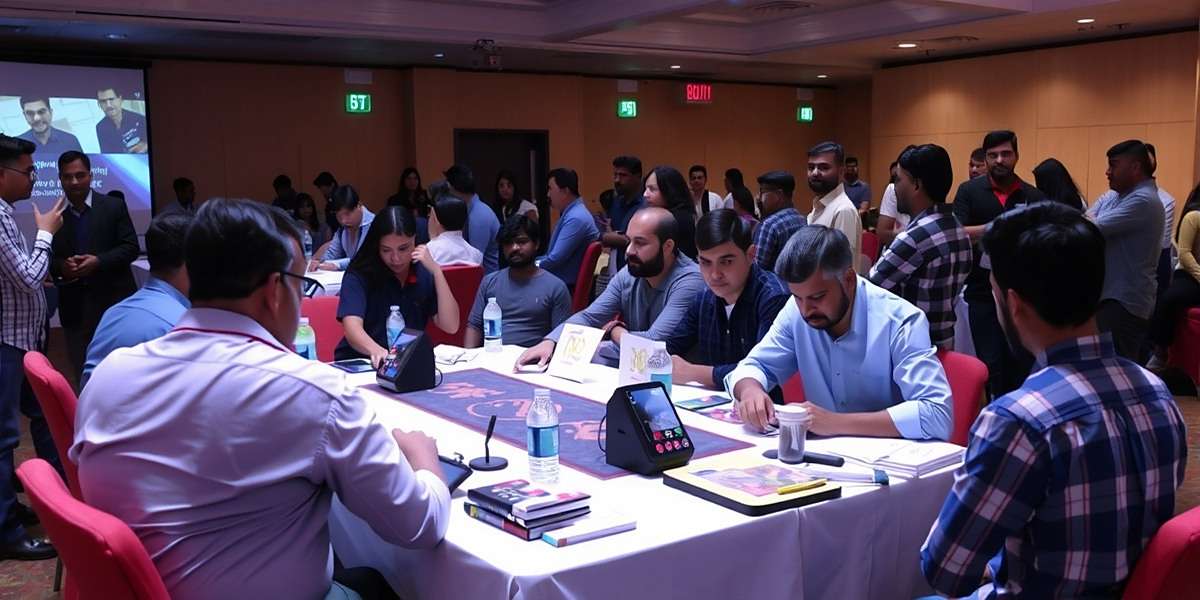
National Championship
The annual Masala Masters Duel National Championship has quickly become one of India's most anticipated gaming events. The 2023 championship, held in Bangalore, attracted over 8,000 participants from across the country and was watched by over 3.5 million viewers online.
The tournament features a unique format where players must use region-specific decks in the early rounds, showcasing the diversity of strategies from different parts of India. Only in the final rounds can players use mixed regional decks, creating exciting clashes of culinary styles.
The 2023 champion, 24-year-old Rajeshwari Patel from Ahmedabad, won using an innovative Gujarati-inspired deck featuring Jaggery Jester, Dhokla Defender, and the legendary Gujarati Thali card. Her victory speech, where she compared her strategy to preparing a perfect Gujarati thali with balanced flavors, went viral across Indian social media platforms.
Prizes for the national championship include not just cash rewards (₹10 lakh in 2023) but also a year-long supply of premium spices from across India and a chance to collaborate with the game developers on creating a new card inspired by their regional cuisine.
The 2024 championship is scheduled to be held in Hyderabad, with plans to expand to 16 regional qualifiers and a prize pool of ₹25 lakh, reflecting the growing popularity and commercial success of Masala Masters Duel.
Content Creation and Streaming
The Masala Masters Duel community has a thriving content creation scene, with thousands of Indian creators producing gameplay videos, strategy guides, and comedic skits based on the game's characters.
Popular Tamil YouTuber "Spice King Gopi" has over 1.8 million subscribers with his energetic Masala Masters Duel videos that blend gameplay with cooking tips using the spices featured in the game. His "Cook and Conquer" series, where he prepares a dish using a spice before demonstrating its in-game uses, has become a hit with both gamers and food enthusiasts.
In Hindi, "Masala Masti Gaming" features family-friendly gameplay where parents and children play together, discussing both strategy and the real-world uses of different spices. Their videos have been praised for promoting intergenerational bonding through gaming, with many viewers commenting that they now play the game with their own parents.
Live streaming of Masala Masters Duel tournaments on platforms like Loco and Rooter has also grown significantly, with top streamers earning sponsorships from spice companies and restaurants – a unique crossover between the gaming and culinary industries that's particular to India.
Fan art and cosplay of the game's spice characters have become popular at Indian gaming conventions, with some artists even creating intricate costumes that incorporate real spices into their designs, creating a multi-sensory experience that's both visual and aromatic.
The game's developers actively engage with the content creation community, hosting monthly creator contests and featuring the best community content in their official social media channels and in-game loading screens.
Future Updates and Roadmap
The developers of Masala Masters Duel have announced ambitious plans for the game's future, with a strong focus on expanding regional content and introducing new features based on player feedback from across India.
In a recent interview with Gaming India Magazine, lead developer Aisha Rahman stated, "Our goal is to make Masala Masters Duel the most comprehensive celebration of Indian culinary heritage in gaming form. We're just getting started, and there are so many regional cuisines and traditions we're excited to bring to the game."
Upcoming Features
• Spice Market Trading System – A player-to-player trading system where players can exchange duplicate cards, scheduled for release in January 2024. The system will include regional marketplaces where certain card types are more abundant, reflecting real-world spice trade patterns between Indian states.
• Family Recipe Mode – A cooperative mode where up to 4 family members can play together, with special "Recipe Challenges" that require specific card combinations to create virtual dishes. This mode aims to encourage family gaming sessions, which are popular in many Indian households, especially during festivals.
• Regional Chef Characters – New legendary cards based on famous regional chefs and cooking styles, each with unique abilities that reflect their culinary specializations. The first wave will include a Punjabi dhaba chef, a Chettinad master cook, a Gujarati thali specialist, and a Kashmiri wazwan expert.
• Spice Plantation Mini-Game – A resource management side game where players can grow virtual spices to earn in-game currency and card upgrades. The mini-game will feature region-specific crops and growing conditions based on real agricultural practices in different parts of India.
• Augmented Reality Features – Testing AR functionality that allows players to "summon" card characters in their own kitchens using their mobile cameras. This feature will initially launch in select metro cities before nationwide rollout, allowing players to see virtual spice warriors appear on their real kitchen counters.
• Live Cooking Events – Monthly events where famous Indian chefs stream live cooking sessions while playing Masala Masters Duel, sharing both culinary tips and gaming strategies with viewers. These events will feature exclusive in-game rewards for viewers who follow along at home.
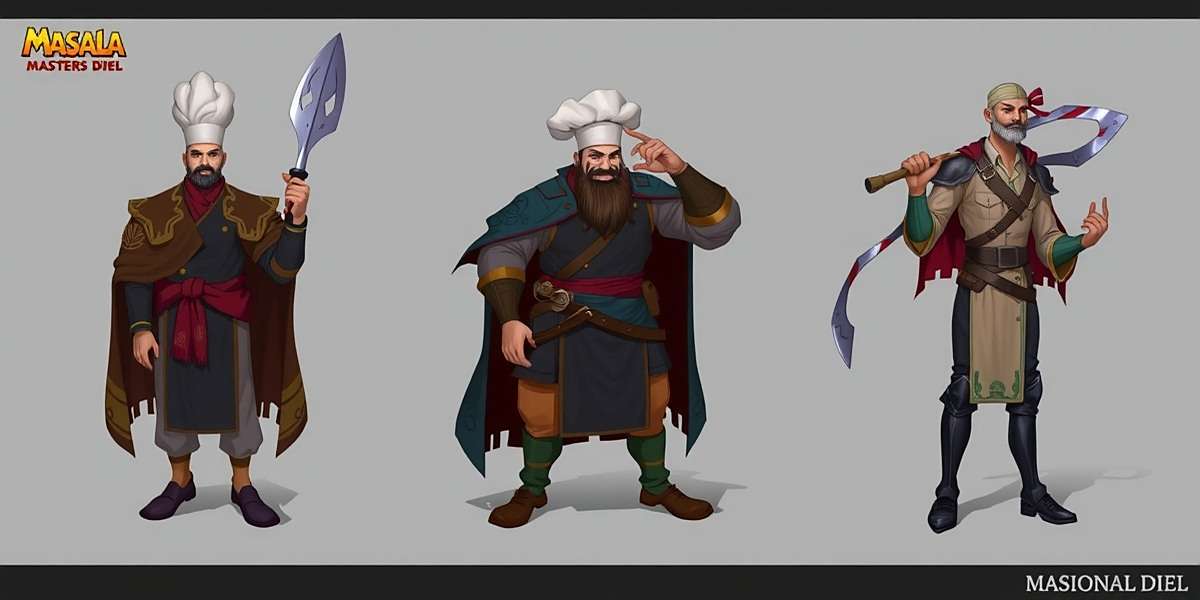
Regional Expansion Plans
While Masala Masters Duel already supports 15 regional languages, the development team plans to add 5 more in 2024: Kashmiri, Manipuri, Konkani, Sindhi, and Nepali, further expanding the game's reach to underrepresented linguistic communities.
A major update scheduled for early 2024 will focus on Northeast Indian cuisines, introducing new spice cards like Sichuan Pepper Warrior, Bamboo Shoot Sentry, and Fermented Fish Fighter that reflect the unique flavors of the region.
International expansion is also on the horizon, with plans to launch versions in neighboring South Asian countries. The Bangladeshi version will feature Hilsha Fish cards and special pitha-themed events, while the Nepali version will include Himalayan herb cards and Dashain festival events.
A global English version, titled "Spice Masters Unite," is in development with educational elements explaining Indian spices to international audiences. This version will maintain the core gameplay while adding cultural context explanations to help global players understand the significance of each spice and culinary tradition.
The developers have also announced plans for physical card game versions to be sold in Indian bookstores and spice markets, allowing players to enjoy Masala Masters Duel offline with family and friends – a nod to India's strong tradition of physical card games like Teen Patti and Ganjifa.
Looking further ahead, the team has hinted at a possible animated series based on the Masala Masters Duel universe, featuring the adventures of spice characters in a culinary world. This would expand the game's universe beyond the mobile platform into a full-fledged entertainment franchise.
Related Game Types
This game is recommended by daman games. To discover more quality Indian games, please visit daman games.